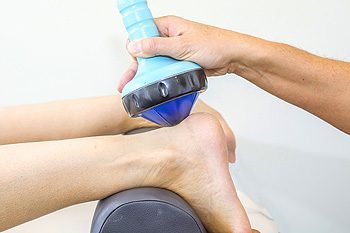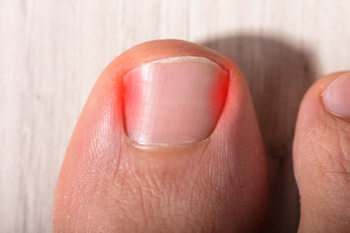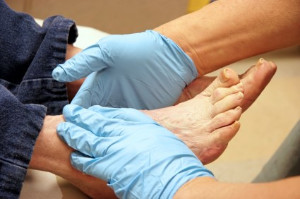Items filtered by date: August 2023
The Power of Extracorporeal Shockwave Therapy for Plantar Fasciitis

Extracorporeal Shockwave Therapy, abbreviated ESWT, is a proven treatment for chronic musculoskeletal pain. This therapy is done for injuries persisting for over six weeks, where the body struggles to heal itself. ESWT prompts an irritation at the injury site, transitioning it from chronic to acute, which facilitates natural healing. It is often combined with other therapies such as offloading and strengthening exercises. ESWT is particularly effective for plantar fasciitis, which previously necessitated extended rest, cortisone shots, or surgery. ESWT involves delivering low and high energy shockwaves to the plantar fascia, stimulating the body's self healing mechanisms. It enhances blood circulation, encourages cell regeneration, and reduces nerve sensitivity. It is noninvasive and has no side effects. Typically, four to six sessions spaced a week apart are needed for optimal results, with symptom improvement often noticed after just two sessions. Healing continues for up to three months post treatment. If you have plantar fasciitis and are interested in learning more about this type of treatment, it is suggested that you make an appointment with a podiatrist to see if ESWT is right for you.
Shockwave therapy is a treatment commonly used to treat various injuries and conditions, particularly plantar fasciitis in the feet. To learn more, consult with Gary J. Kaiserman, DPM from Achilles Footcare Center. Our doctor can provide the care you need to keep you pain-free and on your feet.
Shockwave Therapy
Shockwave therapy is a new treatment option designed to treat bone conditions such as tennis elbow, shoulder pain, and others. Shockwave therapy uses high intensity sound waves that are directed to the affected tissues of the body with pinpoint accuracy. The effects are very beneficial, leading to a production of collagen fibers, eliminating inflammation.
Who Benefits from Shockwave?
Shockwave is recommended for patients suffering from heel pain and associated problems. Heel pain is a common condition which can be caused by obesity, overexertion, and spending a substantial amount of time on hard floors with your feet exposed and unsupported.
Fast and Easy
The therapy is actually a simple process that can leave patients feeling better the very next day. Shockwave therapy is not as dramatic as it sounds. It enables more blood flow to effected areas, addressing the source of the problem and allowing treatment to last for a long time.
Treatment & Recovery Time
Shockwave treatment will enable your feet to recover quickly. This is especially important since surgery is not required. It is cost effective and does not require the use of anesthesia. This treatment is a better option to surgery, since it is proven safe.
If you have any questions, please feel free to contact our offices located in Forest Lane and West Kiest Boulevard Dallas, TX . We offer the newest diagnostic and treatment technologies for all your foot and ankle needs.
Causes and Treatments for Ingrown Toenails

Within the world of common foot woes, ingrown toenails stand as a painful and bothersome issue that can disrupt daily life. These occur when the edges of a toenail grow into the surrounding skin, leading to inflammation and discomfort. Often stemming from improper nail trimming, wearing tight footwear, or genetic reasons, ingrown toenails can bring about pain, swelling, and possibly infection. Treating this condition involves gentle soaking, proper nail trimming techniques, and wearing comfortable, well-fitting shoes. In cases of infection, consulting a podiatrist is crucial in preventing complications. In more severe instances, surgical intervention may be necessary to provide long lasting relief. By understanding the causes and exploring the range of treatments, individuals can actively engage in preventing ingrown toenails. If you have developed an ingrown toenail, it is strongly suggested that you confer with a podiatrist who can offer you treatment methods that are correct for you.
Ingrown toenails may initially present themselves as a minor discomfort, but they may progress into an infection in the skin without proper treatment. For more information about ingrown toenails, contact Gary J. Kaiserman, DPM of Achilles Footcare Center. Our doctor can provide the care you need to keep you pain-free and on your feet.
Ingrown Toenails
Ingrown toenails are caused when the corner or side of a toenail grows into the soft flesh surrounding it. They often result in redness, swelling, pain, and in some cases, infection. This condition typically affects the big toe and may recur if it is not treated properly.
Causes
- Improper toenail trimming
- Genetics
- Improper shoe fitting
- Injury from pedicures or nail picking
- Abnormal gait
- Poor hygiene
You are more likely to develop an ingrown toenail if you are obese, have diabetes, arthritis, or have any fungal infection in your nails. Additionally, people who have foot or toe deformities are at a higher risk of developing an ingrown toenail.
Symptoms
Some symptoms of ingrown toenails are redness, swelling, and pain. In rare cases, there may be a yellowish drainage coming from the nail.
Treatment
Ignoring an ingrown toenail can have serious complications. Infections of the nail border can progress to a deeper soft-tissue infection, which can then turn into a bone infection. You should always speak with your podiatrist if you suspect you have an ingrown toenail, especially if you have diabetes or poor circulation.
If you have any questions, please feel free to contact our offices located in Forest Lane and West Kiest Boulevard Dallas, TX . We offer the newest diagnostic and treatment technologies for all your foot care needs.
Are You Suffering From Ingrown Toenails?
Nurturing Diabetic Feet with Knowledge and Caution

Proper foot care is of utmost importance for individuals with diabetes, as they are more susceptible to foot complications. Diabetic neuropathy, a condition that impairs nerve function, can reduce sensation in the feet, making it challenging to detect injuries or infections. Regular foot inspections, daily washing with lukewarm water, and thorough drying are essential to maintaining foot health. Applying moisturizer to prevent dry skin and wearing shoes that fit well may help to prevent potential wounds. Trimming toenails straight across and avoiding sharp corners can reduce the risk of ingrown toenails. It's crucial to avoid walking barefoot in addition to inspecting shoes for foreign objects before wearing them. By incorporating these simple, yet vital, steps into their routine, individuals with diabetes can safeguard their foot health and minimize the risk of serious complications. If you have diabetes, it is strongly suggested that you are under the care of a podiatrist who can help you to manage this condition.
Diabetic foot care is important in preventing foot ailments such as ulcers. If you are suffering from diabetes or have any other concerns about your feet, contact Gary J. Kaiserman, DPM from Achilles Footcare Center. Our doctor can provide the care you need to keep you pain-free and on your feet.
Diabetic Foot Care
Diabetes affects millions of people every year. The condition can damage blood vessels in many parts of the body, especially the feet. Because of this, taking care of your feet is essential if you have diabetes, and having a podiatrist help monitor your foot health is highly recommended.
The Importance of Caring for Your Feet
- Routinely inspect your feet for bruises or sores.
- Wear socks that fit your feet comfortably.
- Wear comfortable shoes that provide adequate support.
Patients with diabetes should have their doctor monitor their blood levels, as blood sugar levels play such a huge role in diabetic care. Monitoring these levels on a regular basis is highly advised.
It is always best to inform your healthcare professional of any concerns you may have regarding your feet, especially for diabetic patients. Early treatment and routine foot examinations are keys to maintaining proper health, especially because severe complications can arise if proper treatment is not applied.
If you have any questions please feel free to contact our offices located in Forest Lane and West Kiest Boulevard Dallas, TX . We offer the newest diagnostic and treatment technologies for all your foot and ankle needs.
Tips for Foot Care and Maintenance

Our feet are the foundation of our mobility, and practicing everyday foot care is essential for overall well-being. Healthy feet can be maintained when practical tips are followed. It is crucial to wear shoes that fit correctly and have adequate room for the toes to move freely. Daily hygiene can begin with washing the feet daily with soap and water and ensuring they are thoroughly dried to prevent bacterial and fungal infections. The skin can feel good when the feet are frequently moisturized, focusing on the heels and soles. Additionally, ingrown toenails may be prevented when the toenails are trimmed correctly. Foot muscles and flexibility may be improved with regular foot exercises such as toe curls and ankle circles. Excess weight can strain your feet, and maintaining a healthy weight can reduce the risk of foot problems. If you would like more information about effective foot care routines, it is suggested that you consult a podiatrist.
Everyday foot care is very important to prevent infection and other foot ailments. If you need your feet checked, contact Gary J. Kaiserman, DPM from Achilles Footcare Center. Our doctor can provide the care you need to keep you pain-free and on your feet.
Everyday Foot Care
Often, people take care of their bodies, face and hair more so than they do for their feet. But the feet are a very important aspect of our bodies, and one that we should pay more attention to. Without our feet, we would not be able to perform most daily tasks.
It is best to check your feet regularly to make sure there are no new bruises or cuts that you may not have noticed before. For dry feet, moisturizer can easily be a remedy and can be applied as often as necessary to the affected areas. Wearing shoes that fit well can also help you maintain good foot health, as well as making it easier to walk and do daily activities without the stress or pain of ill-fitting shoes, high heels, or even flip flops. Wearing clean socks with closed shoes is important to ensure that sweat and bacteria do not accumulate within the shoe. Clean socks help to prevent Athlete’s foot, fungi problems, bad odors, and can absorb sweat.
If you have any questions please feel free to contact our offices located in Forest Lane and West Kiest Boulevard Dallas, TX . We offer the newest diagnostic and treatment technologies for all your foot and ankle needs.
Various Types of Bunion Surgery

A bunion is a bony lump that forms on the side of the big toe. It can become larger, and cause the other toes to move toward each other. Patients who have bunions and find difficulty in completing daily activities may choose to have bunion surgery performed. A bunion can be caused by genetic reasons, or from frequently wearing shoes that are too tight. Foot surgery may be considered, which may be successful in removing the bunion. This is referred to as a bunionectomy, and can be chosen if pain relief is not obtained from nonsurgical methods. After local anesthesia is administered, the podiatrist can determine which type of bunion surgery is best for you. When the joint in the big toe is cut and realigned, this is referred to as an osteotomy. An exostectomy is defined as surgery that removes the bunion and the toe is not aligned. When the deformity is corrected by using metal places or screws, this type of bunion surgery is known as an arthrodesis. If you have a bunion, and are considering surgery, it is strongly suggested that you are under the care of a podiatrist who can determine which type of foot surgery is correct for you.
Foot surgery is sometimes necessary to treat a foot ailment. To learn more, contact Gary J. Kaiserman, DPM of Achilles Footcare Center. Our doctor will assist you with all of your foot and ankle needs.
When Is Surgery Necessary?
Foot and ankle surgery is generally reserved for cases in which less invasive, conservative procedures have failed to alleviate the problem. Some of the cases in which surgery may be necessary include:
- Removing foot deformities like bunions and bone spurs
- Severe arthritis that has caused bone issues
- Cosmetic reconstruction
What Types of Surgery Are There?
The type of surgery you receive will depend on the nature of the problem you have. Some of the possible surgeries include:
- Bunionectomy for painful bunions
- Surgical fusion for realignment of bones
- Neuropathy decompression surgery to treat nerve damage
Benefits of Surgery
Although surgery is usually a last resort, it can provide more complete pain relief compared to non-surgical methods and may allow you to finally resume full activity.
Surgical techniques have also become increasingly sophisticated. Techniques like endoscopic surgery allow for smaller incisions and faster recovery times.
If you have any questions please feel free to contact our offices located in Forest Lane and West Kiest Boulevard Dallas, TX . We offer the newest diagnostic and treatment technologies for all your foot and ankle needs.

